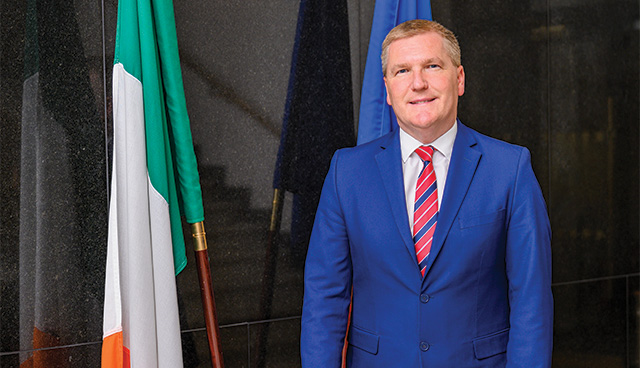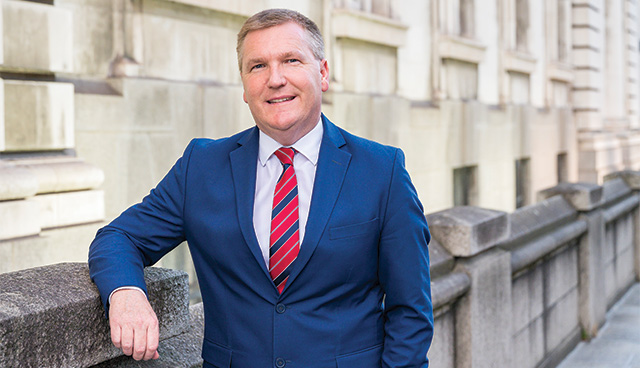Recovery and reform: Minister for Public Expenditure and Reform, Michael McGrath TD

The Department of Public Expenditure and Reform (DPER) is perhaps the most pervasive of all government departments, offering a ‘helicopter view’ of government. Ciarán Galway sits down with DPER Minister Michael McGrath TD to discuss priorities and ambitions.
Having sat as a government backbench TD from 2007 until 2011, Michael McGrath spent nine years on the Fianna Fáil opposition benches before his party returned to government in June 2020 and he was appointed as Minister for Public Expenditure and Reform.
Almost five months into his new role, the deputy for Cork South-Central is “thoroughly enjoying” what is a “hugely challenging role”.
“I have come in at a time of great challenge. As soon as I was appointed, we were immediately focused on the July Stimulus Package, so that was almost like a mini budget in the first few weeks of the Government’s life,” he says.
This was swiftly followed by Budget 2021 which outlined the highest proposed level of spending in the history of the State. Aside from delivering this programme of spending, priorities for the Minister include securing a new public service pay deal, working towards a free trade agreement, an early review of the National Development Plan (NDP) and decisions on public health restrictions in response to Covid-19.
Budget 2021
Inevitably, Budget 2021 was largely dictated by the Covid-19 pandemic and, as such, health was the single most important factor in its composition. “The core objectives framing the Budget were to keep people safe, provide the resources necessary through our health service to deal with the pandemic through the winter and right through 2021,” the Minister outlines.
With an allocation of €22 billion in 2021, the largest ever health budget is intended to mitigate the pandemic while increasing the permanent capacity of the health service with additional beds and the recruitment of around 16,000 health professionals across the system.
Meanwhile, stressing the Budget’s “commitment to deliver an increased public housing programme and the provision of funding for a range of affordable housing initiatives” he also suggests that it will go some way to initiating the implementation of “a very ambitious climate action agenda”.
Even with the extraordinary context informing Budget 2021, the DPER Minister is adamant that government departments did not get it all their own way. However, “that didn’t stop departments coming forward with hugely ambitious proposals and asks that we were simply unable to meet”. Simultaneously though, he insists there were no attempts made to “drive a wedge between me and [Finance] Minister Donohoe or our respective departments” and overall, he feels the Budget was well received.
Influence
Detailing some of the broader influences on Budget 2021, McGrath explains that both he and Finance Minister Paschal Donohoe TD share “one overriding objective” and that is to ensure that Ireland avoids a scenario similar to the 2008 financial crisis and its subsequent fallout.
In particular, the Minister references his “experience of witnessing, in close quarters, what the government at that time had to do and the impact it had on society” as well as the burden it placed on then Finance Minister, the late Brian Lenihan jnr, who had a “huge influence” on McGrath’s career.
“We believe that the best way of achieving that is by supporting our economy at this time because that is the right thing to do, but in addition, keeping a firm eye on having sustainable public finances and a responsible approach to budgeting.
“We are determined to stay within the pack in European terms and to be unremarkable. We don’t need to be among the lowest deficit group, but we certainly cannot afford to be an outlier at the other end,” he maintains.
Covid supports
Throughout the Covid crisis, payment supports such as the Pandemic Unemployment Payment (PUP), the Employment Wage Subsidy Scheme (EWSS) and the Covid Restrictions Support Scheme (CRSS) have been a lifeline to individuals and business across the State. However, the DPER Minister acknowledges that “they’re not sustainable forever”.
The decision to prolong the PUP scheme until the end of March 2021 and also to restore the top rate of €350 was taken “because we felt that it was the right thing to do when so many people were losing their jobs directly because of health restrictions”. However, while wage supports will continue throughout next year, the Government has resisted providing a longer-term commitment to the PUP. Instead, an income-linked system was introduced and will be kept under review.
The Minister is cognisant that there are currently over 200,000 people on the live register on much lower rates of social welfare. “There are a range of factors that need to be taken into account. We’ll take it into review. We now have 350,000 people on the PUP. It’s costing about €104 million per week. These are very large sums of money and no government can sustain that indefinitely, but for now it is the right thing to do,” he asserts.
Viability
Asked if there will come a point whereby payment supports for business might be restricted to enterprises which exhibit long-term viability beyond the pandemic, rather than acting as a lifeline to unviable enterprises, the Minister argues that businesses that were viable up until March 2020 deserve “the benefit of the doubt” and should be given every possible chance of coming through the crisis.
Conceding that some businesses will inevitably fail, he contends: “Many more would have failed except for the extraordinary level of state support, which has been extended through the commercial rates waivers, the restart grants, the Employment Wage Subsidy Scheme and of course the Covid Restrictions Support Scheme for businesses that are shut or are doing minimal trade a result of government imposed restrictions.
“Those are very difficult calls for any government to make about individual businesses. But, as time goes by, I think the picture will become clearer as to what sectors will be permanently scarred and what businesses may not survive. For now, the focus is on giving them every fighting chance of coming through. There is light at the end of the tunnel. We had very positive news on the vaccine front and so hopefully we won’t have to sustain this level of support for as long a period as we otherwise would.”
Public Service
One positive consequence of the Covid-19 crisis, as identified by McGrath, is a “renewed sense of appreciation of what really matters and of the imperative to have good public services”. As a result, he envisages, “we will have a larger state coming out of the pandemic”.
Highlighting efforts to secure a potential successor to the Public Service Stability Agreement, the DPER Minister is hopeful. Paying tribute to “the outstanding work of our public servants right through the Covid-19 pandemic”, the Minister believes that a new public service pay deal would deliver valuable certainty and stability, however, he does not underestimate the challenge of agreeing such a deal.
We are determined to stay within the pack in European terms and to be unremarkable. We don’t need to be among the lowest deficit group, but we certainly cannot afford to be an outlier at the other end.
“Our public service pay bill next year will be close to €22 billion. It is about 30 per cent of our overall current expenditure so I think that agreeing a deal that provides certainty to both sides is the most desirable outcome. But there will be needs on both sides. The unions will have asks on behalf of their members and I understand that, but I also have to take account of the wider economic environment and the strain that our public finances are under.
“We will be looking, of course, to continuing with the reform agenda and for that to be part of a successor agreement to the PSSA. I think the next number of weeks will be decisive as to whether we get a deal or not,” he calculates.
National debt
With the imposition of Level 5 restrictions in late 2020, the Government deficit is now expected to total €22 billion in 2020 and €25 billion in 2021, or 6.3 per cent of GDP and 7 per cent of GDP respectively. This is more than double the 3 per cent deficit limit under the Stability and Growth Pact, which has been temporarily suspended.
“These are huge sums of money,” McGrath accepts, adding: “We are going to have a national debt that is over €240 billion by the end of next year and, thankfully, we are able to fund that at the moment because the country is credit worthy.
“We can borrow at historic low interest rates. Even though our stock of debt is rising, our servicing costs are falling and the average interest rate that we are paying across our total portfolio of debt is falling and is now 1.6 per cent. So, the benefit of that low-interest rate environment has been of enormous value to Ireland. Without that, we would not be able to do what we are doing in continuing with this level of support.”
However, once the European Central Bank withdraws its exceptional support, there will be a need for normalisation. “The markets will take a view of different countries and we know where we need to be. We need to be on a sustainable pathway,” he says.
Deficit reduction
The current level of volatility renders it difficult to make predictions with any degree of certainty, however, Ireland must demonstrate that it has a plan for deficit reduction.
“Early next year, we will lay out our medium-term fiscal framework, setting out our pathway to reducing the deficit because when the extraordinary interventions of the European Central Bank end, we don’t want to be exposed because we know the potential risks that come with that for countries.”
The Government is currently working on a new National Economic Plan and in April 2021 will publish its plan for deficit reduction in the Stability Programme Update.
“I think Ireland has demonstrated, over the last decade, that it has the capability of putting its public finances on a sustainable path. We know the direction that we need to go. The best way of achieving that is by getting the economy back to growth and bringing about economic recovery,” the Minister says.

As time goes by, I think the picture will become clearer as to what sectors will be permanently scarred and what businesses may not survive. For now, the focus is on giving them every fighting chance of coming through.
For now, the strategy of running large budget surpluses to reduce both the national debt and overreliance on corporate tax receipts has been set aside. “We’ll have a deficit for a number of years for sure. It’s going to take a while to eliminate a deficit of over €20 billion,” McGrath remarks.
“Normal rules have been suspended at EU level for now. At some point in time they will be reinstated, and we will have to start moving initially towards the 3 per cent deficit and then ultimately towards a broadly balanced budget. That’s what we will do. The issue of paying down national debt is down the line. For now, it’s about getting the deficit into a sustainable position and that will take a number of years.”
Revenue raising
As such, additional revenue raising measures will be inevitable, though the Minister insists it is too early to say when they might be introduced. Indicating that the Government will approach the matter on a budget-by-budget basis, he maintains that “it would be unwise of any government minister in an economic portfolio to categorically rule out doing things down the line”.
“There are no direct plans to do so at this point in time. There will be a new Commission on Welfare and Taxation set up by government in the next number of weeks and I expect that that commission will identify options that will be open to government.
“I think it’s fair to say that the PRSI system in Ireland is in need of an overhaul. We need to examine what is being paid in and what people are getting in return for that.”
NDP review
Amid the ongoing economic crisis, infrastructure investment has been identified as a route to sustainable recovery and the Government is determined to pursue a countercyclical approach to public spending. Any cuts to investment at this time, it is felt, would likely compound an already difficult situation.
“This is the time to stand behind public investment. We are expanding capital investment, even though the State’s finances are under great strain, but we have reached a new record high of over €10 billion in capital investment for 2021.
“It’s almost certain we will see a diverting away from some commercial construction and there will be capacity there for the State to avail of. The idea is to recognise that there is return from investment, that this is the time to do it and that it provides genuine support and employment for the economy but also increases the permanent productive capacity of the Irish economy,” McGrath states.
In November 2020, the DPER Minister brought forward and launched a mid-term review of the National Development Plan (NDP) to reassess investment in the context of Programme for Government priorities.
McGrath advocates for a “larger, more ambitious” plan and the Government intends to outline a new 10-year capital investment envelope with five-year rolling budgets for individual departments.
Asked what he envisages, the Minister responds: “I can’t put a figure on it at this point in time, but it will be a larger plan, we’re adding three years to the plan. We’re going out to 2030 and we’re looking at the capacity within the system to deliver on all of these projects
“I would be expecting departments to give more up-to-date estimates of the cost of delivering different projects and we expect departments to prioritise projects in line with the Programme for Government commitments, in climate change, housing, transport and so on, and also in a way that is consistent with the overarching vision for the country, which this government has reaffirmed its commitment to, in the form of Project Ireland 2040.”
Intragovernmental relations
The collaborative approach to Budget 2021 established a sense of cohesion between the government parties that had been conspicuously absent. This cohesion is perhaps best personified by the constructive working relationship between the ministers for Public Expenditure and Reform and Finance.
McGrath describes it as a “good working relationship” and reflects on his interactions with Paschal Donohoe TD during the four years in which Fianna Fáil underpinned the minority Fine Gael government through a confidence and supply arrangement.
The issue of paying down national debt is down the line. For now, it’s about getting the deficit into a sustainable position and that will take a number of years.
“I think a mutual respect has built up and I think we have a reasonable understanding of each other, and we are politicians who adopt a pragmatic approach and try to find a way of working through problems. I think it’s important for government that the two ministers in these departments work well together and we certainly do,” he says.
However, the DPER Minister does concede that it is difficult to maintain a distinct party identity in coalition. “We have had challenges in the last number of months and some of the opinion polls haven’t been very good, but I think we have to take a longer view of this. We haven’t been in government in a decade, we have an opportunity now to demonstrate that we can govern well, that we can help the country to meet the major challenges that it is facing with Covid, with economic recovery, with Brexit, climate action and providing the investment in health and housing that is badly needed.
“We are occupying key portfolios within the government. I think we need to just knuckle down, focus on the job at hand, do the best that we can. I believe that that is the most effective way of convincing people that Fianna Fáil is best placed in government where it can and will deliver.”
Discussing his personal ambition, McGrath suggests that a leadership vacancy in Fianna Fáil is unlikely to arise for a number of years. Asked if he intends to one day lead the party, he replies that he hasn’t “ruled it in or out”.
“When that opportunity does arise, I’ll consider the option of going forward at that stage. But for now, I love the job that I am doing. I am learning a lot every day. I think Micheál Martin is proving to be an excellent Taoiseach and I think he deserves the full support from the party and the public. I know how much he is putting into at a personal level and I will do all I can to support him and we’ll see what happens down the line. Who can predict the future?”





